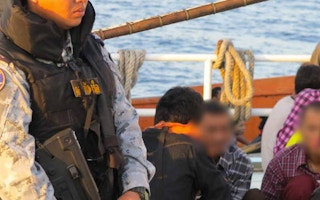Greenpeace has called for a ban on transhipping after a year-long investigation found that rogue Thai fishing vessels using slave labour have moved to remote waters to evade the reach of the law.
To continue reading, subscribe to Eco‑Business.
There's something for everyone. We offer a range of subscription plans.
- Access our stories and receive our Insights Weekly newsletter with the free EB Member plan.
- Unlock unlimited access to our content and archive with EB Circle.
- Publish your content with EB Premium.
Transhipping is the process of moving fish from one ship to another at sea. This enables fleets to remain at sea for months, sometimes years, free from the scrutiny of regulators.
Thai fleets have been using trafficked migrants from Myanmar and Cambodia to keep their operations going, plundering the ocean without returning to land, the investigation has shown.
Greenpeace, in a report titled Turn the tide released last week, has documented a shift in operations of 76 Thai vessels from home waters to the ecologically sensitive Saya de Malha Bank in the Indian Ocean, more than 7,000 km from Thailand’s seafood hub, Samut Sakhon.
The NGO began its investigation after an expose by Associated Press in March last year on systemic human rights abuses in the Thai fishing industry.
During the course of Greenpeace’s investigation, the Thai government has confirmed that six trafficked workers have died from Beriberi, a disease caused by vitamin B deficiency, on board the rogue vessels.
The NGO told Eco-Business that it suspects more deaths have gone unreported.
The report highlights the widespread mistreatment of workers, including overwork and regular physical abuse of exhausted and malnourished crew.
The investigation highlighted how surimi - a fish meat paste made from the vessels’ catch - has found its way into freezers, sushi bars and cat food around the world.
“As long as transshipment at sea continues, it will be nearly impossible for any seafood company to guarantee that the fish they are selling is both sustainable and ethically caught,” Oliver Knowles, sustainable tuna project leader at Greenpeace New Zealand, said in a statement.
“The case for banning transshipments at sea grows stronger by the day. The evidence in our report puts more pressure on the Thai and international fishing industry to phase out this deeply problematic practice that allows so many problems to flourish,” he said.
Companies found to be using surimi linked to the rogue fleets include Nestlé and its pet food arm Nestlé Purina PetCare’s Fancy Feast, Mon Petit and Gourmet ranges.
The Switzerland-headquartered consumer goods giant publicly admitted in November last year that its products sourced slave-caught fish from Thai vessels, and it announced a plan to remove abusive practices from its supply chain.
Though Nestlé’s announcement was commended for its transparency, critics pointed to the company’s objection to human rights allegations elsewhere. In February this year, Nestlé attempted to get the US Supreme Court to quash a legal suit that connected the company with child slave labour in Ivory Coast cocoa farms.
Last month, Nestlé announced the progress it had made a year after announcing its action plan to tackle seafood supply chain abuses, claiming that seafood ingredients it sources are now “99 per cent traceable”.
The company said it is working with Thai Union, Thailand’s Department of Fisheries and supply chain assessment group Verité to develop a training programme to educate fleet owners on worker’s rights in Thailand.
It is also looking to give fishing boat crew a voice, working with Thailand-based NGO The Issara Institute to develop a channel to air work practice grievances.
In a statement to detail its efforts, Nestlé told Eco-Business that it was committed to supporting a ban on transshipment at sea, and that human rights abuses had “no place in our seafood supply chain”.
“
The case for banning transshipments at sea grows stronger by the day. The evidence in our report puts more pressure on the Thai and international fishing industry to phase out this deeply problematic practice that allows so many problems to flourish.
Oliver Knowles, sustainable tuna project leader, Greenpeace New Zealand
Here is the statement from the company in full:
“Nestlé Purina has committed to a ban on all transshipments at sea and we are updating our Responsible Sourcing Guidelines to include this prohibition. Our rationale is that transshipment at sea enables rogue fishing vessels to engage in IUU fishing and other illegal activities by not returning to port for extended periods of time, several years in some cases.
“Aboard these vessels is where we believe the worst forms of Human Rights abuses may occur because of the lack of regulation, enforcement, and transparency offshore. Due to the opaque nature of offshore fishing practices and worker treatment on vessels, Nestlé Purina supports banning all transshipments at sea as a step toward eliminating IUU fishing and preventing Human Rights abuses at sea.”
“Nestlé Purina is confident that we are taking the right actions to ensure that seafood products from problematic Thai fishing vessels are not entering the supply chain of Nestlé Purina. Human rights abuses have no place in our seafood supply chain. Nestlé was among the first companies to issue a comprehensive plan to work with NGO partners to address this complex issue.”
“Greenpeace has acknowledged our leadership in eliminating forced labor from the seafood supply chain. Over the past two years, Nestlé and NGOs have worked collectively to find the right mechanisms to implement Nestlé’s policies governing the responsible sourcing of raw materials. In light of Greenpeace’s findings, Nestlé Purina has committed to a ban on all transshipments at sea.”

















